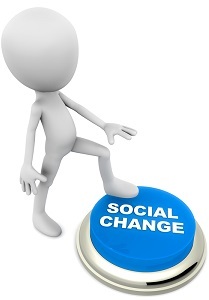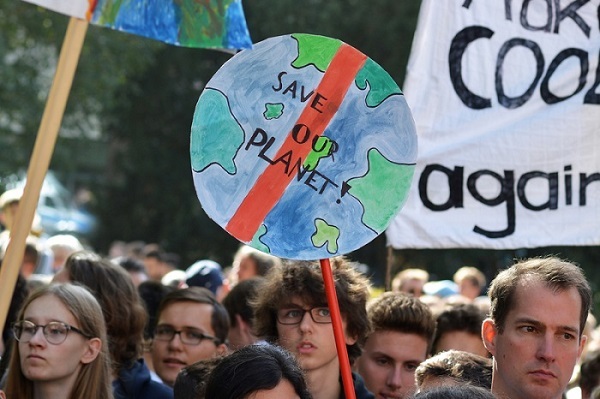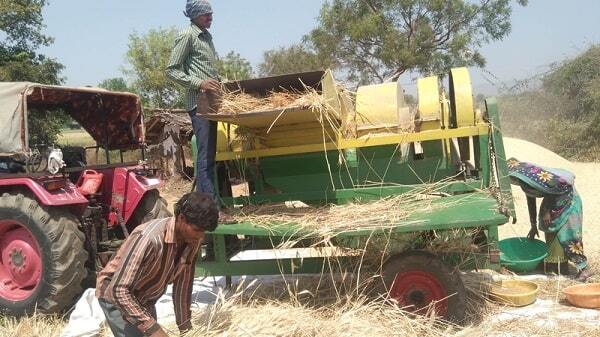

 Social change is unavoidable, contagious and multi-leveled. Change in one level of society will lead to change in another level. Similarly, change in one social institution will impact the functioning of other social institutions. In this era of globalisation and interconnected world, change is fast and easier. It is transforming every aspect of society and culture at a greater speed.In this background, the article will discuss some of the agents of social change.
Social change is unavoidable, contagious and multi-leveled. Change in one level of society will lead to change in another level. Similarly, change in one social institution will impact the functioning of other social institutions. In this era of globalisation and interconnected world, change is fast and easier. It is transforming every aspect of society and culture at a greater speed.In this background, the article will discuss some of the agents of social change.
Change is an ongoing process. According to sociologists,social change is a process where various social institutions and structures undergo structural, functional and ideological changes due to the influence of transformations in culture. This impacts the hierarchy in society, its social order, interpersonal relationships and influences people’s belief system. Sociologists claim that social change is inevitable due to the functions we perform everyday. Social change is also not restricted to one single geographical location. Its factors, sources and agents can be present in various locations or across many societies.

Protest triggers social change. Above is a protest by young people during the Global Climate Strike.
Social change is not induced due to one factor. Each of its factors, causes and reasons are interlinked even though they can be broadly categorised. Social conflict in the form of war or protests can bring changes in society. They can challenge any policy or oppression and force the existing government or authority to bring legal changes.
Agents refers to the things or people that have the ability to create change. There can be several agents of social change like population, environment, culture, technology, population, social institutions, etc. Some of them are discussed below.
Technological developments occur when humans use their scientific knowledge to build technical tools or machines and innovate them regularly. Till now technological innovations have brought many changes in the lifestyle of people which transferred society and its structures. It also induced vast cultural changes across societies and centuries.
For example, the invention of the car and its affordability has increased its use in most nations of the world. This has increased people’s speed of mobility and accessibility. This led to the building of better transport systems, including roads. This also increased pollution, car accidents, loss of lives, health issues due to pollution, etc.
Similarly, the invention of computers have revolutionised the information and communication technology sector in the world. It has created a worldwide ,network of connectivity leading to unlimited flow of information. These kinds of innovations have brought people closer to each other virtually irrespective of their physical distance. It has transformed social relations, customs and traditions by making knowledge and information more accessible.
Change in one social institution creates change in every social institution. For example, industrialization and technological development introduced the growth of private companies which impacted the functions of the government sector. It also reduced the quantity of manual labour in the agricultural sector.

Farmers using a thresher machine for separating husk and wheat grain.
Massive changes can also be seen in educational institutions where skill based courses have been introduced besides digital learning and examination. In the case of medical institutions, technical equipment is now readily available, medicines and other necessities are largely produced which has led to the improvement of the overall human race. Thus, such changes in different sectors have increased literacy, well being and knowledge of people which have brought significant changes in their social and cultural structure.
The idea of modernization is different for different people. In India, it is a form of social change and this idea originated from the Indian sociologist M.N.Srinivas. Modernization can be seen in the political, agricultural, economical, social and cultural sector.
It creates a shift from traditional knowledge or activities to modern ideas and actions, through knowledge formation, implementation and innovation. It has the ability to create modern societies, urban spaces but may also wipe out the small traditional communities. Transfer of knowledge makes life and work smooth but also increases the threat of digital surveillance and cybercrime.
Industrialization and globalisation has caused an increase in migration and population. This increase in human population means simultaneous increase in consumption and discharge of waste. It also means building more industries, homes, and other institutions leading to deforestation.
This is also the reason behind more and more natural disasters which are occuring due to extreme changes in the climate. Some of these changes include soil erosion, excessive rainfall or drought, landslides, extreme heat waves or cold waves. Due to improvised infrastructure facilities, nowadays people are able to travel to their desired locations which may also include vulnerable areas where they face natural disasters, consequent death and several kinds of losses.
Since, social change can occur everyday without people being aware of its process and time, it is better for them to encourage positive changes through positive activities and mindsets. For example, people can reduce pollution and find sustainable ways of using the natural resources to prevent depletion and wastage. In case of cultural transformations people can decide their limitations and find ways to preserve their traditional roots. Similarly, they can also make constructive use of the internet, technology and look after their digital wellbeing. Thus, it can be concluded that humans are the most important agent of social change.
Q1. What do you understand about digital crowdsourcing?
Ans. Digital crowdsourcing is a technological innovation which involves the process of procuring help, resources or knowledge or any kind of services from people in a digital platform and not from people in traditional places. This process is fast, smooth and can reach out to more people without making physical distance a barrier.
Q2. What are the disadvantages of modernization?
Ans. Modernization has the ability to degrade ethics and values. It can wipe off traditional cultures and spaces. It can also reduce the importance of religion and customs. It can also cause immense damage to the environment.
Q3. What do you understand about the term ‘cultural lag’?
Ans. ‘Cultural lag’ is a term introduced by the sociologist William F. Ogburn. According to him, since one social change brings another social change, sometimes one social or cultural change takes a lot of time to bring another change. This delay in change is referred to as ‘cultural lag’.